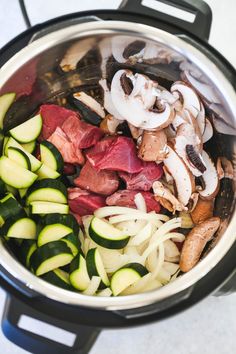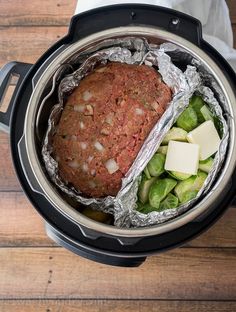How to Avoid a Mettalic Taste While Using an Instant Pot?

Instant pots are helpful for various activities, like quickly cooking meats, making flavorful soups, and even making a quick and simple breakfast. However, you may notice a metallic taste in your meals over time.
When cooking food in an instant pot, a straightforward approach to avoid a metallic flavor is to make sure the pot is clean and free of surface scratches, which can cause a metallic taste. Make sure you’re using a stainless steel pot because it’ll taste better and won’t leave a metallic flavor.
We’ll go through the reasons why you could have a metallic taste in your food, why it happens, and how to avoid it in this post.
Why Does Food in an Instant Pot Have a Metal Taste?
A stainless pot is the most popular form of cookware. Because of its non-reactive nature, it is often regarded as the ideal material for cooking. This implies that there is no chemical reaction when you cook acidic foods.
Aluminum cookware is the most prone to reactions. However, there will be reactions in pots and pans with low nickel content when cooking acidic meals.
It’s because acidic foods like lemon juice and tomatoes have a metal-like flavor when cooked in a low-percentage nickel kettle.
The longer your meal is left in the instant pot, the longer it has to react with the metal. Even leftover food will react and may impact the contents of the pot in the future.
In an Instant Pot, How Do I Prevent Metal Taste?
Of course, there are methods to avoid the metallic flavor in an instant pot. If none of these work, return to the store where you purchased it or contact the manufacturer.
Purchase Goods of Good Quality
Purchasing high-quality cookware or an instant pot is the first and most crucial step in avoiding metal flavor in your food. A high amount of chromium and nickel is known to be present in stainless steel pots and cookware.
It’s critical to get pans and pots with a high nickel content since they’re less reactive and leave little to no metallic flavor.
In general, if the nickel percentage is more significant than 8%, you’re safe. Still, if it’s lower, you’re likely to taste metal in your meal.
Watch for Scratches on the Surface

While buying a pot with a high nickel content is a brilliant idea, you must still make sure it is in good condition. It doesn’t matter how high the nickel % is if the surface of your pan or pot is destroyed.
You can never be too careful when it comes to surface scratches. Even the slightest scratch can expose your cookware to metal compounds, which can alter the taste of your food.
Stainless steel pots and pans are stain-resistant, but they are not scratch-proof.
When cleaning your pot, use caution.
If you ever find yourself in a scenario where you need to remove stuck-on food particles while doing the dishes, the best course of action is to soak the pot in hot, soapy water to loosen the food’s grip.
This strategy will save you from cleaning your pot too hard and scratching its surface.
It’s advisable to use mild dish detergent and a delicate towel when cleaning your pots. Scratching the surface of your pots is made much more likely by using abrasive sponges and detergents. When using stainless utensils, take caution not to scratch the pot.
Another issue to be concerned about is mineral accumulation in your water. Washing your cookware with distilled water may seem like a reach, but it’s a good idea.
Time to Clean Your Pot
To limit the time your pan has to react with the metal, don’t leave your meal in the pan after it’s finished cooking. Another technique to get rid of any residual acidic substances is to wash your pan and pots right away.
Another thing to remember is to wash and dry your pots and pans as soon as possible after purchasing them. New cookware, regardless of quality, will almost certainly have a metallic flavor.
It is due to the fact that cookware is cleaned and polished before being packaged and distributed to retail outlets. Because of the cleaning procedure, there’s a considerable likelihood that metallic flavor particles are still present.
Acidic foods should not be cooked in your Instant Pot.
With acidic meals, the stainless steel in an instant pot tends to react. I’m referring to ordinary vinegar, tomato, and lemons and their juices. The longer you cook these things in the instant pot, the more metal contaminates your food. As a result, an instant pot should not be used for such things.
When preparing food, try to use vegetable or canola cooking oil. These oils have a reputation for filling the tiny pits in your pots. This will act as a barrier between the stainless steel and the food.
If you believe it’s usual or “okay” for your meals to have a metallic flavor, you’re mistaken.
Here are several items that may have a metallic flavor when cooked in an instant pot:
- Sauce made with tomatoes
- Vinegar
- A pinch of salt
- Juice of citrus fruits
- Juice of lemon
Cleaning Your Instant Pot: How To Avoid Scratches
There are five fundamental principles to follow when it comes to avoiding scratches while cleaning your pots and pans.
No.1 Keep the temperature in the room constant.
Before immersing your pan in water, make sure it’s at room temperature. Sudden temperature swings are bad for cookware and can cause severe damage.
No.2 There are no abrasive materials.
Bleach, steel wool, and other abrasive products should not be used to clean your stainless steel pot since they might damage it quickly.
No.3 Do Not Forget To Wash Your Pot

To limit the time your pan has to react with the metal, don’t leave your meal in the pan after it’s finished cooking.
Another technique to eliminate any residual acidic substances is to wash your pan and pots right away. Allowing dirt and oil to accumulate in the first place is not a good idea. Cleaning your pan while it’s still warm is probably the most effective method because it’ll make your life much more straightforward.
No.4 Do Not Scrub Your Hot Pan
There’s nothing too heavy here. It should be warm, and soap and a regular sponge should be used. However, you can use baking soda if it’s particularly nasty since you haven’t washed it in a long time.
Baking soda is my choice because it is inexpensive and likely already exists in your home. Before you scrape off the baking soda, be sure it hasn’t dried off.
Baking soda also adheres to grease, making dirt washing much simpler.
No.5 Only use the heat as the last resort.
To get rid of tenacious and severe grime, you’ll have to boil your saucepan essentially. Yes, you must place the pan in a bigger pot and fill it with water and baking soda. After it has finished boiling, you may remove your pan while it is still hot and clean away any filth with ease.
How Do I Get Scratches Out Of My Instant Pot?
While it’s a good idea to cease using or discard pots that have scratches, an instant pot with a few scratches isn’t absolutely unsalvageable. There are a few options for removing the scratches without buying a new pot.
The most well-known method for removing a scratch-off your pot is to use scrotchbite. You brush the pad against the grain of the metal on your pan with care. Please make sure not to rub it against the grain since this will result in a more apparent scratch.
Polish the area using a microfiber cloth as soon as the scratch is no longer visible. Another alternative is using a stainless steel lubricant to give it a gleaming appearance.
If You Taste Metal in Your Food, What Should You Do?
As I previously stated, the first step is to confirm that the meal causes the metallic flavor. If the harsh metallic taste remains, try drinking some water. If it washes away with water, the issue might be due to the meal or how it was prepared in an instant pot.
You might not need to toss out the entire dinner because the metallic content is so low that it won’t hurt you.
However, address the issue as soon as possible by using any of the preventative procedures I discussed previously in this essay. The sooner you take these actions, the sooner you’ll be able to enjoy your meals again.











